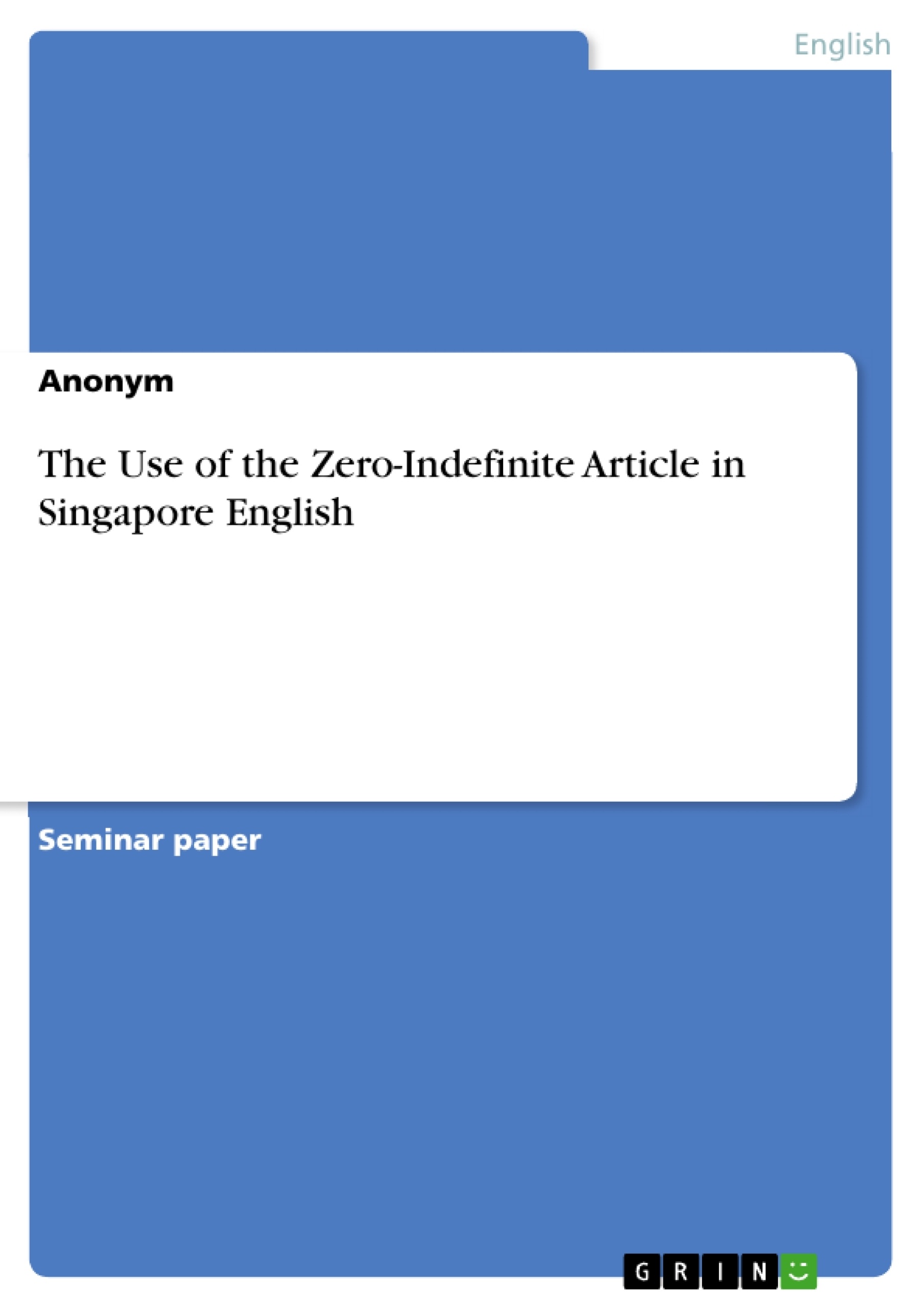Singapore is a country with a remarkable linguistic diversity. This is due to the heterogeneous population and numerous ethnic groups which inhabit it. Over the years, the different languages in Singapore, dominated by Chinese dialects like Mandarin, Hokkien or Cantonese, had to compete with another input variety as a result of permanent British settlement in 1819, namely British English. Nowadays, it is the language of government, business, law courts, science and also education. English is taught in school as the First Language, whereas the people’s mother tongue stands behind.
Finally, a variety called "Singapore English" (SgE), which had a significant input from both, the prevalent Chinese variety Mandarin and British English, evolved and is constantly positioned between influences of these two. In contact varieties of English, like SgE is one, various features which distinguish the language emerged. Often, they are even pervasive or obligatory, although they do not occur in Standard English (StE). One of them is the zero-indefinite article where StE requires one. This seminar paper will investigate the usage of the zero-indefinite article in SgE. It is supposed to reveal how often speakers of SgE actually realize the indefinite article in a communication, either spoken or written, and if they do not make use of it, in which contexts the omission occurs.
This aspect is of particular interest for the whole topic of World Englishes, because speakers of StE often tend to consider features of a variety as a mistake. But they are not only learner-errors, there is an underlying pattern and a reason for the occurrence of such features and this term paper aspires to provide an impulse in reference to approach the structure of indefinite article omission in SgE.
Inhaltsverzeichnis (Table of Contents)
- Introduction
- Methodology
- Findings
- Discussion of the findings
- Conclusion
- Outlook
Zielsetzung und Themenschwerpunkte (Objectives and Key Themes)
This seminar paper aims to investigate the usage of the zero-indefinite article in Singapore English (SgE). It explores the frequency of indefinite article realization in both spoken and written communication, analyzing the contexts in which omission occurs.
- The influence of Chinese languages and British English on the development of SgE
- The prevalence and significance of zero-indefinite article usage in SgE
- The distinction between learner errors and systematic patterns in language variation
- The role of context in understanding indefinite article omission in SgE
- The application of quantitative and qualitative methods to analyze language variation
Zusammenfassung der Kapitel (Chapter Summaries)
- Introduction: This chapter introduces the topic of the zero-indefinite article in SgE, highlighting the linguistic diversity of Singapore and the influence of various languages, including Mandarin and British English. It explains the research focus and aims of the paper.
- Methodology: This chapter details the methodology used for data collection and analysis. The research draws from the Singapore component of the International Corpus of English, consisting of written and spoken data. The chapter explains the specific focus on the indefinite article's application in occupational titles.
Schlüsselwörter (Keywords)
This research focuses on Singapore English, zero-indefinite article usage, language variation, World Englishes, quantitative and qualitative analysis, corpus linguistics, and the influence of context.
Frequently Asked Questions
What is Singapore English (SgE)?
SgE is a variety of English that evolved in Singapore, heavily influenced by British English and Chinese dialects like Mandarin, Hokkien, and Cantonese.
What is the "zero-indefinite article" feature in SgE?
It refers to the omission of indefinite articles (a/an) in contexts where Standard English would typically require them.
Is the omission of articles in SgE just a learner error?
No, linguistic research suggests it is a systematic feature with an underlying pattern, rather than simple mistakes made by learners.
How does the research analyze article omission?
The study uses quantitative and qualitative methods, drawing data from the International Corpus of English (Singapore component), focusing on areas like occupational titles.
Why did English become so prominent in Singapore?
Following British settlement in 1819, English became the language of government, law, business, and education in Singapore.
What is the goal of this seminar paper?
The goal is to investigate how often and in what specific contexts SgE speakers omit the indefinite article in spoken and written communication.
- Arbeit zitieren
- Anonym (Autor:in), 2018, The Use of the Zero-Indefinite Article in Singapore English, München, GRIN Verlag, https://www.grin.com/document/494110



